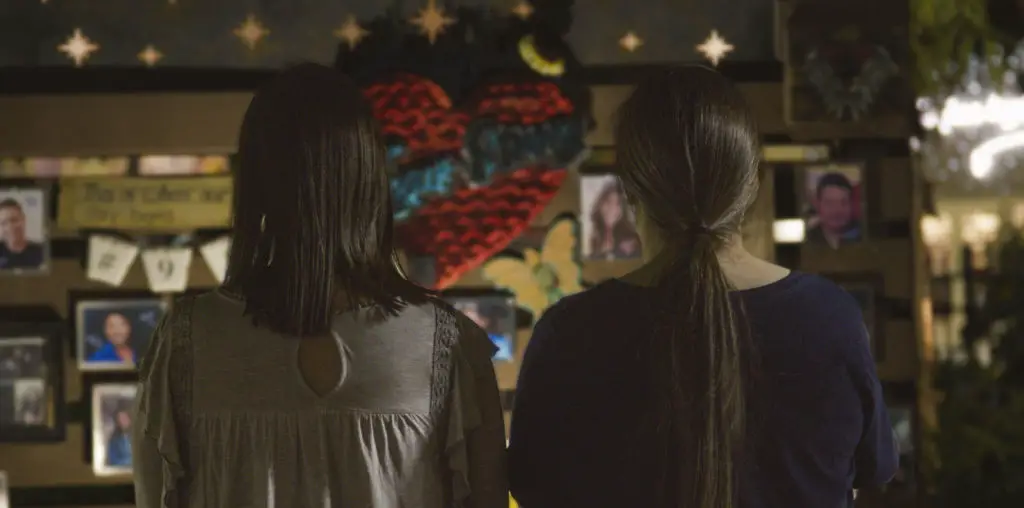
That’s Richard, dressed in black, on his knees and blubbering. He looks like he’s repeatedly apologizing to a gravestone, but the reality is that he is apologizing to his dead son. (He would be the one buried beneath the stone.) Why are we watching him, and why would we involve ourselves in his dilemma? Those questions and others will go completely ignored as we watch “Tortured Soul”.
Richard is a divorced father, proscribed to that outpost of weekend visits with his child who gets an earful of vitriol about his father for five days while Richard gets all of two days to attempt to unravel the indoctrination. This will prove to be a challenge given the mother was correct in her damnation of the guy’s character. After an initial burst of paternal regard, Rich brings his kid home where he and his blonde consort focus their attention on their piles of Columbian flake instead of Jimmy frolicking near the diving board. The expected tragedy plays out, but after fishing little Jimmy out of the deep end, the good news is they can use the coke mirror to test for breathing.
The death of his son inspires Richard to sit in the tub and shave his wrists, but his girlfriend discovers him in time to rescue the movie. Pity us, the viewers. Ricky now spends his remaining days in an existential stupor, fraught with personal demons and haunted by voices, right up to the moment that you would say that his essence—his very soul is…I guess tortured.
This yarn of dread is mysterious for many reasons, but mainly because you cannot help but ask yourself, “Why do I give a toss about this mook?” For starters, Richard does not strike you as father material; he strikes you as that guy you see in a bar at midnight, Saturday night, with his eyes closed and a Marlboro stuck to his lip as he spends $10 in the jukebox, so can play air guitar to Grand Funk and the Guess Who. I wouldn’t entrust this greasy troll to care for a houseplant let alone a ten-year-old with ADD.
Ricky continues to grapple with his emotional erosion, hearing voices calling out to him as he walks the street. In the lone scene of enjoyment, Richard is walking the streets, holding his ears to blot the entreaties when he approaches three youths. He shrieks at them, “Did you hear that??!!”, and the three kids tear off like a trio of merekats with their tail ablaze. Adding to his vexation, Ricky gets a visit from his landlord, who has trouble focusing on his tenant, but has no trouble staying on subject. In a scene that lasts minutes, these two discuss the rent, and not having money, and paying the rent, and getting the cash, and the overdue rent. Then they talk about going to the bank, but only after mentioning the rent getting paid. By now, it occurred to me that the title was not a reference to the character but to the audience.
With his life circling the drain, the money crunch manages to set Ricky off for good and he begins yelling at God for help, and after receiving no immediate largesse, he promptly begins to tear assorted pages out of a Bible. This provocation brings the devil himself right into Richard’s living room, but to be quite honest, it was not as chilling as you may expect. With a prim goatee and turtleneck sweater, this version of Old Gooseberry was more effete then feral. A note to the director: you may induce more terror if Mephistopheles doesn’t look like a ceramics curator from Quebec.
Well, the god-of-hellfire has the standard offer going and Rich decides to take it, but the ending hinted that, like we have been trained to think, these deals usually come with a catch. This time what happens…ah, never mind. I’ll just say it does not turn out well, and then a nonsensical ending abruptly announces itself, further muddling an already obtuse story. Basically, an unseemly end befalls our Ricky, but since we neither like, nor care for this loser, what was supposed to be a tragedy ends up making you feel good—your reward for sitting through a film that leaves no evidence on why it was made. Next time you get your oil changed, take some time and peer into the motor pool, choose any youth you see in over-alls who looks as if he did not have the time to graduate high school, then ask yourself a question: “Would I want to see a movie based on the details of his life?” If your answer is yes, this may be a title worth looking into.

